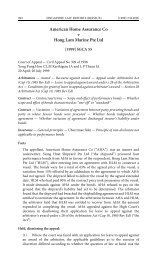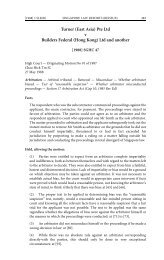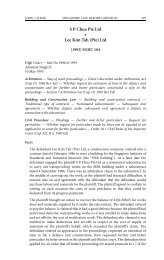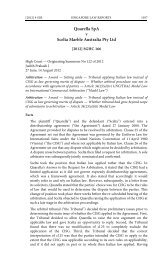Tang Boon Jek Jeffrey v Tan Poh Leng Stanley - Singapore Law
Tang Boon Jek Jeffrey v Tan Poh Leng Stanley - Singapore Law
Tang Boon Jek Jeffrey v Tan Poh Leng Stanley - Singapore Law
Create successful ePaper yourself
Turn your PDF publications into a flip-book with our unique Google optimized e-Paper software.
[2001] 2 SLR(R) SINGAPORE LAW REPORTS (REISSUE) 273<strong><strong>Tan</strong>g</strong> <strong>Boon</strong> <strong>Jek</strong> <strong>Jeffrey</strong>v<strong>Tan</strong> <strong>Poh</strong> <strong>Leng</strong> <strong>Stanley</strong>[2001] SGCA 46Court of Appeal — Civil Appeal No 107 of 2000Yong Pung How CJ, L P Thean JA and Chao Hick Tin JA23 April; 22 June 2001Arbitration — Arbitral tribunal — Powers — Power to revisit and reverse previousaward — Meaning of “final award” — When arbitrator functus officio — FirstSchedule International Arbitration Act (Cap 143A, 1995 Rev Ed)FactsOn 10 January 2000, the arbitrator made an award dismissing the respondent’s(“<strong>Tan</strong>’s”) claim and the appellant’s (“<strong><strong>Tan</strong>g</strong>’s”) A$1.3m counterclaim. The awardwas stated to be “final save as to costs”. A week later, the arbitrator issued anadditional award in which he acknowledged that in his earlier award, he hadomitted to deal with <strong><strong>Tan</strong>g</strong>’s counterclaim relating to cash deposits. Followingsubmissions by <strong><strong>Tan</strong>g</strong>’s solicitors that the arbitrator had not dealt with thequestion of interest on the cash deposits and the question of costs, the arbitratorallowed for further arguments by the parties. After hearing such furtherarguments, the arbitrator issued another award on 6 March 2000 (“the Marchaward”), in which he allowed the A$1.3m counterclaim with interest, on theground that his earlier decision was erroneous. In the March award, thearbitrator also dealt with the issue of interest on the cash deposits and thequestion of costs. <strong>Tan</strong> then applied to the High Court to have the March awardset aside. The High Court judge was of the view that the arbitrator was functusofficio when he made the March award and therefore the award was a nullity andwas set aside. <strong><strong>Tan</strong>g</strong> appealed. It was common ground that the proceedings beforethe arbitrator were an international arbitration governed by the InternationalArbitration Act (Cap 143A, 1995 Rev Ed) (“IAA”) and consequently, theUNCITRAL Model <strong>Law</strong> on International Commercial Arbitration (“the Model<strong>Law</strong>”).Held, allowing the appeal:A “final award” had to be the one that decided or completed everything that thearbitral tribunal was expected to decide, including the question of costs. Thiswas regardless of the label given to the award by the arbitral tribunal, since suchlabel could not be conclusive if the facts were that there were still matters yet tobe adjudicated upon. Until such a final award was given, the arbitral tribunal’smandate still continued and it was not functus officio. On the present facts, as thearbitrator had not decided on all the issues, his mandate was not terminated andhe was entitled to reconsider his decision and if he thought fit, as he did here, toreverse himself: at [34] to [36], [38].
274 SINGAPORE LAW REPORTS (REISSUE) [2001] 2 SLR(R)Case(s) referred toChung & Wong v CM Lee [1934] MLJ 153 (distd)Legislation referred toArbitration Act (Cap 10, 1985 Rev Ed)International Arbitration Act (Cap 143A, 1995 Rev Ed) First Schedule (consd);ss 3, 4(1), 12, First Schedule Arts 12, 32, 32(1), 32(3), 33, 33(1)(b), 33(3), 34,34(2), 34(4), ch VIIIArbitration Act 1950 (c 27) (UK) s 16Arbitration Act 1996 (c 23) (UK) s 58(1)Alvin Yeo Khirn Hai SC and <strong>Tan</strong> Kay Kheng (Wong Partnership) for the appellant;Philip Jeyaretnam and Yip Wai Lin Jamie (Helen Yeo & Partners) for the respondent.[Editorial note: The decision from which this appeal arose is reported at [2000] 3SLR(R) 847.]22 June 2001 Judgment reserved.Chao Hick Tin JA (delivering the judgment of the court):1 This appeal raises a general question of law as to the power orjurisdiction of an arbitrator under the International Arbitration Act(Cap 143A, 1995 Ed) (“IAA”) and the UNCITRAL Model <strong>Law</strong> onInternational Commercial Arbitration (“the Model <strong>Law</strong>”) to revisit orreverse an award he has made. UNCITRAL is the acronym for UnitedNations Commission on International Trade <strong>Law</strong>. The Model <strong>Law</strong> is set outin the First Schedule to the IAA. At the hearing below, the judge set asidethe further award rendered by the arbitrator on the ground that, when hemade that further award, he was functus officio.The facts2 We shall first briefly set out the background facts giving rise to theapplication to set aside the further award. In 1994, the appellant, Mr <strong>Jeffrey</strong><strong><strong>Tan</strong>g</strong> (“<strong><strong>Tan</strong>g</strong>”) and the respondent, Mr <strong>Stanley</strong> <strong>Tan</strong> (“<strong>Tan</strong>”), together withtheir respective group of investors, formed a joint-venture corporationcalled Dynasty Pacific Group (“DPG”). Dispute arose between them whichled to litigation in Australia. Pursuant to mediation, a settlement agreementdated 24 January 1998, was reached. In the settlement agreement there wasan arbitration clause for the settlement of disputes arising thereunder. TheDPG had basically two main lines of business – property development andhotels. Under the settlement agreement, the businesses were duly dividedbetween <strong><strong>Tan</strong>g</strong> and <strong>Tan</strong> and their respective associates. It also set out thedetails on how the division should be carried out.3 However, disputes arose between the parties as to the obligations eachparty should fulfil under the settlement agreement. The disputes were
[2001] 2 SLR(R) <strong><strong>Tan</strong>g</strong> <strong>Boon</strong> <strong>Jek</strong> <strong>Jeffrey</strong> v <strong>Tan</strong> <strong>Poh</strong> <strong>Leng</strong> <strong>Stanley</strong> 275referred to Mr Giam Chin Toon SC as arbitrator (“the arbitrator”). Therewere two sets of disputes giving rise to two separate arbitration proceedings.We are here concerned with only the second arbitration. Before thearbitrator, <strong><strong>Tan</strong>g</strong> was the respondent and <strong>Tan</strong>, the claimant. There wereclaims and counterclaims between the parties. One of the counterclaimsbrought by <strong><strong>Tan</strong>g</strong> was for a sum of A$1,375,762.64 (hereinafter referred to as“the A$1.3m counterclaim”). On 10 January 2000 the arbitrator made areasoned award, with the following concluding results:1 The claimants’ (<strong>Tan</strong>’s) claim be dismissed2 The respondents’ (<strong><strong>Tan</strong>g</strong>’s) counterclaim be dismissed.3 This award is final save as to costs.4 Two days later, on 12 January 2000, the solicitors for <strong><strong>Tan</strong>g</strong> wrote tothe arbitrator, pointing out that, although he had dismissed <strong><strong>Tan</strong>g</strong>’scounterclaim, it would appear that an aspect of the counterclaim of <strong><strong>Tan</strong>g</strong>relating to cash deposits was left out by the arbitrator and that the award, indismissing <strong><strong>Tan</strong>g</strong>’s counterclaim, did not refer to these cash deposits. <strong><strong>Tan</strong>g</strong>’ssolicitors accordingly asked the arbitrator to make an additional award,pursuant to Art 33 of the Model <strong>Law</strong>.5 On 17 January 2000, the arbitrator issued an additional awardwherein he acknowledged that he had omitted to address <strong><strong>Tan</strong>g</strong>’scounterclaim relating to the seven cash deposits and duly made the awardin respect thereof. However, as regards <strong><strong>Tan</strong>g</strong>’s A$1.3m counterclaim, thearbitrator reaffirmed the 10 January 2000 award and refused to make anyaward in respect of that counterclaim because he did not think that <strong><strong>Tan</strong>g</strong>was entitled to it. The arbitrator gave his reasons.6 Following the delivery of this additional award, on 21 January 2000,<strong><strong>Tan</strong>g</strong>’s solicitors wrote again to the arbitrator raising two points. First, theysought further arguments before the arbitrator relating to the A$1.3mcounterclaim on the ground that the arbitrator appeared to have decidedthe matter on the basis of a point which was not argued before him. Second,they sought clarification as to whether <strong><strong>Tan</strong>g</strong> would be entitled to interest onthe cash deposits which were to be refunded to him under the additionalaward of 17 January 2000.7 The arbitrator acceded to the request of <strong><strong>Tan</strong>g</strong> for further argumentsand heard the parties on 31 January 2000. On 6 March 2000, the arbitratorrendered “Additional Award II” wherein he dealt with not only thecounterclaim for A$1.3m but also the question of interest on the cashdeposits and the question of costs, which question was reserved under theaward of 10 January 2000. On the A$1.3m counterclaim, the arbitratorstated that his previous interpretation of the relevant provision of thesettlement agreement as set out in his additional award of 17 January 2000was erroneous. He thus changed his mind and gave an award in respect of
276 SINGAPORE LAW REPORTS (REISSUE) [2001] 2 SLR(R)the A$1.3m counterclaim with interest. This award will hereinafter bereferred to as “the March award”.8 Accordingly, <strong>Tan</strong> applied by way of a motion to have the March 2000award set aside.Reasons given by arbitrator9 In the March award, the arbitrator expressly addressed the questionwhether he had the jurisdiction or power to recall an award and alter it. Wewill now quote the relevant paragraphs of the award where he gave hisreasons why he could do that:It is not in dispute that in the case of judgments pronounced by thecourts, the Judge has the power to re-consider his verdict so long as thejudgment has not been entered or perfected. There is no suchprocedure in an arbitration award. So, a judge can, like in the case ofLim Yam Teck v Lim Swee Cheng (1979) 1 MLJ 162 change his mindafter giving further consideration to the matter. There is, therefore, aperiod in which a judge is permitted to re-consider the matter.Thereafter, if a decision is wrong, it would have to be rectified by aCourt of Appeal.Unfortunately, the position is less clear in an international arbitrationaward where the arbitrator desires to re-consider the matter. There areno direct authorities on the point. If an error is made, there are noexpress provisions whereby the decision could be rectified in a court oflaw. Great injustice would be caused in such a case. It is inconceivablethat the law or public policy would permit such a situation.In addition, it has been submitted by Counsel for the Respondent thatsince there is no procedure of registration or perfection of the Award,the equivalent period for an arbitrator could be when enforcementproceedings are applied for. I agree with this.I am therefore of the view that an arbitrator can re-consider the awardnot only on the terms of Article 33(1) of the Model <strong>Law</strong> but under thegeneral powers given to him to determine the rules and procedure ofthe tribunal which would include the power to re-consider an awardbefore enforcement if the arbitrator so decide. If I have good reasons tore-consider the matter, I should be allowed to do it. Otherwise, aninjustice would be perpetuated.10 It will be seen that essentially the basis upon which the arbitrator felthe had the jurisdiction or power to reconsider an award already delivered isthe overriding consideration of justice so long as the award had not yet beenenforced.Court below11 The judge below was of the view that the March award was a nullitybecause the arbitrator was functus officio when he made that award. Having
[2001] 2 SLR(R) <strong><strong>Tan</strong>g</strong> <strong>Boon</strong> <strong>Jek</strong> <strong>Jeffrey</strong> v <strong>Tan</strong> <strong>Poh</strong> <strong>Leng</strong> <strong>Stanley</strong> 277rendered an award, the powers which an arbitrator still possesses wouldonly be those which were reserved under Art 33 of the Model <strong>Law</strong>. Thatarticle does not empower an arbitrator to recall an award with a view toreversing it.12 As regards <strong><strong>Tan</strong>g</strong>’s alternative argument, that the court should exercisethe discretion conferred upon it under Art 34(4) of the Model <strong>Law</strong> andafford the arbitrator an opportunity to resume the hearing so that theground to set aside the award could be eliminated, the judge said (<strong>Tan</strong> <strong>Poh</strong><strong>Leng</strong> <strong>Stanley</strong> v <strong><strong>Tan</strong>g</strong> <strong>Boon</strong> <strong>Jek</strong> <strong>Jeffrey</strong> [2000] 3 SLR(R) 847 at [36]):AppealArticle 34(4) can be invoked only when there are irregularities in theaward and not when the award is a nullity. Furthermore the power toremit does not apply to an award made after the arbitrator becamefunctus officio.13 Counsel for <strong><strong>Tan</strong>g</strong>, Mr Alvin Yeo, put the issues which we are requiredto consider in this appeal under the following four heads:(a) Whether the judge erred when he decided that the Arbitratorwas functus officio when he made the Arbitration 2 Award;(b) If so, whether the Arbitrator had the jurisdiction to reconsiderthe Arbitration 2 Award as regards the claim for AUD1,375,762.64 andto make the March Award;(c) Whether the Respondent had successfully made out a case forsetting aside under Article 34 of the Model <strong>Law</strong>;(d) In the alternative, whether the judge erred when he refused toremit the March Award to the Arbitrator pursuant to Article 34(4) ofthe Model <strong>Law</strong>.14 As we see it, there is really only one main issue: was the arbitratorfunctus officio vis-à-vis the A$1.3m counterclaim when he made the Marchaward. If he was, then the March award is a nullity and we do not thinkArt 34(4), which gives the court the discretion to remit a case back to thearbitrator either to give the arbitrator an opportunity to resume the arbitralproceedings or to take such other actions as will eliminate the grounds forsetting aside, can be applied to a case such as this. Here, remitting the caseback to the arbitrator will not eliminate the problem.Relevant provisions15 It is common ground that the proceeding before the arbitrator was aninternational arbitration, governed by the IAA. By s 3 of the IAA, the Model<strong>Law</strong> (except ch VIII) is to have the force of law. The relevant provisions areArts 32–34 of the Model <strong>Law</strong> which provide:
278 SINGAPORE LAW REPORTS (REISSUE) [2001] 2 SLR(R)Article 32(1) The arbitral proceedings are terminated by the final award or byan order of the arbitral tribunal in accordance with paragraph (2) ofthis Article.(2) The arbitral tribunal shall issue an order for the termination ofthe arbitral proceedings when:(a) [Not relevant](b) [Not relevant](c) [Not relevant](3) The mandate of the arbitral tribunal terminates with thetermination of the arbitral proceedings, subject to the provisions ofArticles 33 and 34(4).[emphasis added]Article 33(1) Within thirty days of receipt of the award, unless another periodof time has been agreed upon by the parties:(a) a party, with notice to the other party, may request thearbitral tribunal to correct in the award any errors incomputation, any clerical or typographical errors or any errorsof similar nature;(b) if so agreed by the parties, a party, with notice to the otherparty, may request the arbitral tribunal to give an interpretationof a specific point or part of the award.If the arbitral tribunal considers the request to be justified, itshall make the correction or give the interpretation within thirtydays of receipt of the request. The interpretation shall form partof the award.(2) The arbitral tribunal may correct any error of the type referredto in paragraph (1)(a) of this Article on its own initiative within thirtydays of the date of the award.(3) Unless otherwise agreed by the parties, a party, with notice to theother party, may request, within thirty days of receipt of the award, thearbitral tribunal to make an additional award as to claims presented inthe arbitral proceedings but omitted from the award. If the arbitraltribunal considers the request to be justified, it shall make theadditional award within sixty days.(4) The arbitral tribunal may extend, if necessary, the period of timewithin which it shall make a correction, interpretation or an additionalaward under paragraph (1) or (3) of this Article.Article 34(1) Recourse to a court against an arbitral award may be made onlyby an application for setting aside in accordance with paragraphs (2)and (3) of this Article.



![[2011] 1 SLR 727 - Singapore Law](https://img.yumpu.com/51140774/1/166x260/2011-1-slr-727-singapore-law.jpg?quality=85)
![[1983-1984] SLR(R) 447 - Artic Builders & Co - Singapore Law](https://img.yumpu.com/50909204/1/164x260/1983-1984-slrr-447-artic-builders-co-singapore-law.jpg?quality=85)

![[1996] 2 SLR(R) 292 - Lim Eng Hock Peter v ... - Singapore Law](https://img.yumpu.com/47482222/1/164x260/1996-2-slrr-292-lim-eng-hock-peter-v-singapore-law.jpg?quality=85)

![[2006] 1 SLR(R) 197 - PT Asuransi Jasa Indonesia - Singapore Law](https://img.yumpu.com/46425352/1/164x260/2006-1-slrr-197-pt-asuransi-jasa-indonesia-singapore-law.jpg?quality=85)
![[1985-1986] SLR(R) 503 - Woh Hup (Pte) - Singapore Law](https://img.yumpu.com/45676364/1/164x260/1985-1986-slrr-503-woh-hup-pte-singapore-law.jpg?quality=85)



![[2010] 2 SLR 821 - Singapore Law](https://img.yumpu.com/43145563/1/166x260/2010-2-slr-821-singapore-law.jpg?quality=85)
![[2007] 1 SLR(R) 597 - PT Asuransi Jasa Indonesia - Singapore Law](https://img.yumpu.com/42983489/1/164x260/2007-1-slrr-597-pt-asuransi-jasa-indonesia-singapore-law.jpg?quality=85)
![[1989] 1 SLR(R) 433 - Singapore Law](https://img.yumpu.com/42649524/1/164x260/1989-1-slrr-433-singapore-law.jpg?quality=85)
![[1997] 3 SLR(R) 360 - Singapore Law](https://img.yumpu.com/42287507/1/164x260/1997-3-slrr-360-singapore-law.jpg?quality=85)